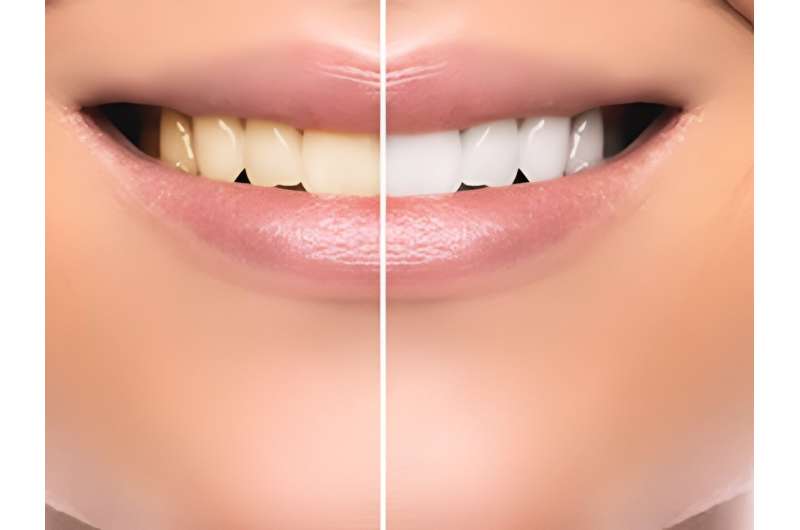This article has been reviewed according to Science X's editorial process and policies. Editors have highlighted the following attributes while ensuring the content's credibility:
fact-checked
reputable news agency
proofread
Tooth whitening: Expert help on getting a brighter smile

People want whiter teeth, surveys show, and the American Dental Association (ADA) has some advice on how to accomplish that.
Over time, teeth can become less white due to a number of causes, including food and drink, tobacco use, age, trauma and medications.
According to the American Academy of Cosmetic Dentistry, when people were asked what they most wanted to improve about their smile, the most common response was whiter teeth. Meanwhile, about 90% of patients told the American Association of Orthodontists that they also wanted tooth whitening.
Coffee, tea and red wine can all stain teeth because of intense color pigments called chromogens that attach to the enamel on the tooth's exterior, the ADA said in a news release.
Two chemicals found in tobacco—tar and nicotine—also stain. Tar is naturally dark. Nicotine is colorless, but then turns yellowish when mixed with oxygen.
Below a tooth's hard, white outer shell is dentin, which is softer. The enamel gets thinner with brushing and the dentin can show through as you age. A tooth can also change color because it's been injured and creates a thicker layer of dentin.
Certain antihistamines, antipsychotics and high blood pressure medications can also darken teeth. Children who were exposed to antibiotics like tetracycline and doxycycline in utero or as a baby may have discoloration of their teeth as an adult. Chemotherapy and head and neck radiation can also darken teeth, according to the ADA.
Teeth can be whitened using products that contain hydrogen peroxide or carbamide peroxide. The bleaches break the stains into smaller pieces, which affects how the color looks.
Unfortunately, this doesn't work on all teeth. Yellow teeth may bleach well, but those that are brown or gray may not respond as well or at all. Whitening will not work on caps, veneers, crowns or fillings. It also won't work on injured teeth or those changed by medications, according to the ADA.
For those who seek whiter teeth, your dentist can explain your options.
All toothpastes help remove surface stains. Choose a whitening toothpaste that has earned the ADA Seal of Acceptance for stain removal. These have additional polishing agents. Unlike bleaches, these products do not change tooth color because they only remove surface stains.
In-office bleaching requires only one office visit. The dentist uses a protective gel or rubber shield to protect your gums, then applies bleach to the teeth.
You can also get an at-home, custom-made tray from your dentist and bleach your own teeth. You can then whiten your teeth at a slower pace, but still with the guidance of a dentist. This can take a few days to weeks.
Over-the-counter bleaching products can be purchased online or in retail stores. They may include strips or toothpastes that bleach teeth. These have a lower concentration of bleach than products the dentist uses.
It's possible that tooth whitening will cause sensitivity. The peroxide may irritate your tooth nerves. In most cases, this is temporary, but delay treatment if it happens.
Overuse of whiteners can damage the tooth enamel or gums, the ADA added, so don't overdo it.
More information: The U.S. National Institute on Aging has tips for taking care of your teeth and mouth.
Copyright © 2023 HealthDay. All rights reserved.




















